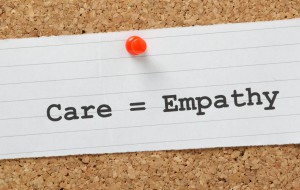The Gift of Empathy
While the Christmas holiday season is a time of joyous anticipation, fellowship, and spiritual renewal for many, it can also be an extremely stressful and trying time for others. If you’re one of those Grinches who can’t see past the aggressive commercialism, long lines, bad weather and annoying songs, perhaps you can do yourself and others a favor by boosting your skill at empathy.
Wait a minute—skill? How can empathy be a skill? Isn’t empathy a feeling you get when you identify with what other people are feeling? Isn’t it a trait that you get a certain amount of when you’re born? How can it be a skill?
Actually researchers have shown that empathy can be taught and improved. Even if you’re not feeling it, there are skills that you can employ to improve others’ perceptions of your empathy level—and actually foster the internal changes that will make you feel it. You actually can fake it ‘til you make it.
Why would you want to? If you’re already stressed out, why on earth would you want to start feeling others’ pain on top of yours?
The obvious answer is that it’s the right thing to do, but if you’re not feeling it, you’re not buying that one. So is there a practical reason for becoming more empathetic? Here are three:
- Irritation and anger are definitely bad for you. But, as Mark Goulston says, “anger and empathy—like matter and antimatter—can’t exist in the same place at the same time. Let one in, and you have to let the other go.”[1]
- If people around you feel valued and understood, their stress levels will go down, which helps you.
- Having trouble knowing what to give? Empathy is a priceless gift you can give someone that costs you almost nothing.
So, how do you go about it? There are two general ways; you can adjust your mindset and/or your behavior.
Adjust your mindset:
When something happens or someone does something that gets under your skin, ask yourself, what’s really going on here? Did the other person purposely set out to attack me personally? Most likely, they did not. First, you never know what’s going on in someone’s life—they may have even more on their minds than you do. For a powerful reminder of this, watch just a minute or so of this video about empathy by the Cleveland Clinic. Goulston suggests giving yourself an empathy jolt: ask yourself, how would I feel if I were him right now?
Apply the same standards to them that you do to yourself. Remember the fundamental attribution error: when someone does something that irritates us, it’s a reflection on their character. When we do the same thing, it’s either an accident or was caused by circumstances.
Adjust your behavior:
Catch others doing something right. It’s easy to think everyone around you is crabby and discourteous, because you’re only going to notice evidence that supports your hypothesis. Make a game of scoring one point every time you see someone do something nice for others. (If you do something nice yourself, that’s not cheating, it’s a way to game the system so that everyone wins.)
Even if you’re not feeling particularly charitable towards the rest of the world, fake it. It will make others happy and because of embodied cognition, your mindset will tend to catch up with your behavior. You already know how to fake it, but in case you need some pointers, check out Helen Riess’s TED talk about practicing EMPATHY.
We all need an empathy boost once in a while, and what better time than the Christmas holidays to give others—and ourselves—that priceless gift?
[1] From one of my favorite books, Just Listen, by Mark Goulston, p. 126.



